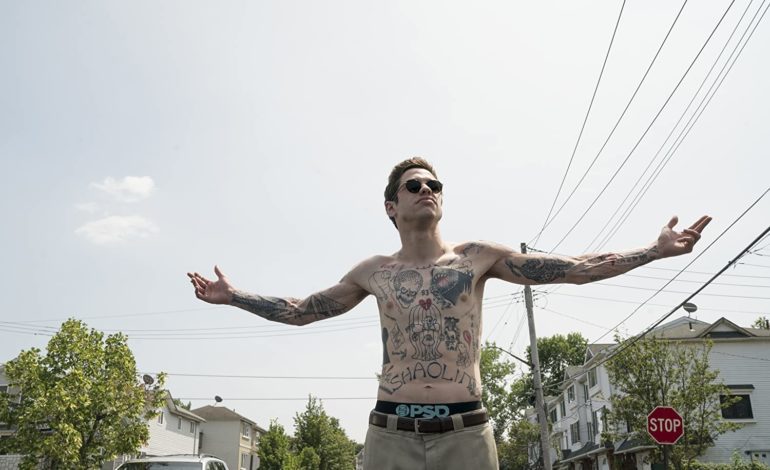

We’ve all been waiting for it: the next big Judd Apatow comedy is among us. The King of Staten Island is here and it’s ready to make a statement for comedies of the future. This time, however, things are different. The roll out is different, adopting a VOD (for obvious reasons, and Trolls: World Tour’s success) release rather than a classic theater release. The themes are slightly different and daring, highlighting at times the very somber suicidal realities of its main character. This feels incredibly personal to lead actor Pete Davidson, who plays an alternate version of himself if he were to have “never found comedy.”
I’ll tell you what, after watching this film you’re going to want to praise Davidson, who gives a stellar performance as Scott Carlin, the big-mouthed “loser” hero. He’s a 24-year-old aimless stoner who still lives with his Mom (Marisa Tomei) on Staten Island. It’s a film environment that isn’t terribly far from Davidson’s real world in many aspects, minus the extreme comic success. It provides an intrusive look into a life that molds this young man into the slacking, internally self-loathing person that he is today. In many ways, this semi-autobiographical story provides context into Pete’s real life, while peeling back the onion of losing his father, a fireman on 9/11, and how that death introduced intense emotional damage to his life.
In The King of Staten Island, Scott’s father was also a fireman who died, but not on 9/11. Nonetheless, this loss shows the pain and the reasoning behind why Scott uses drugs and overall laziness to escape from the harsh reality of his building depression, anxiety and regret. The film practically opens with a suicide attempt where we see Carlin closing his eyes on an expressway for several seconds, nearly missing cars and his own death. It feels like the only place comfortable for him is the basement of his mom’s house. The basement offers somewhat of a home base, where he and his friends speak and live out stoner pipe dreams; an element I found incredibly relatable as a viewer. Most notably the Tattoo-Restaurant idea gives me hope that all of my crazy “million dollar ideas” aren’t so crazy after all.


Carlin’s already somewhat busted up life/love life is thrown again for another loop after he is caught tattooing the son of a fireman, Ray (Bill Burr). Ray soon becomes the love interest of his widowed mother, something that Carlin is NOT here for. Initially against it, his refusal to move on causes a motherly rift and little rivalry with what could be a possible paternal replacement. Could you ask for a better on screen rivalry than two loud mouthed, outspoken stand-up comedians (Burr and Davidson) going at it as their respective characters?
The movie uses this storyline as a way for Carlin to come to terms and heal from his loss by getting in touch with his late father’s spirit through a relationship he builds with the fire department. And let me just say, the “fire department” was stand out. Bill Burr plays in a roll that is somewhat out of suit for him, but he does a great job. Steve Buscemi, who was a real fireman before he started acting and even took on work shifts after 9/11, plays a firehouse elder, Papa. Papa turns out to be one of the few people who can connect Carlin to his father’s essence on a personal level.
The film’s first half is great and very engaging as I found myself emotionally connected to the story and characters. This was personally exciting because that hasn’t necessarily been the trend for Apatow’s past few movies, so the success of King’s script feels like a revitalization of both an established comedic filmmaker and a rising comedic star. It made me think of Trainwreck and how Apatow gave a platform for Amy Schumer as she was finding her voice in the cinematic world. Fun Fact: Amy Schumer actually encouraged Apatow to give Pete Davidson a small cameo in Trainwreck.


Davidson fills this roll perfectly, because IT IS him. There’s an element of believability to his performance that carries the movie through some of the more drawn out portions of its story. The main qualm I had was we spend so much time feeling bad for him in the first and second acts that the third act feels slightly rushed. The results and “happy ending” feel too easily earned, given how down and out they portray Carlin at the start. This may have been a strategic move in the editing room, however, as King does take you past the two hour mark, something that isn’t so common for comedies anymore.
Verdict 4 out of 5 Stars.
While The King of Staten Island’s comedic tone somewhat shifts completely by the end from hardened to mushy, this doesn’t make it a bad movie. I actually thoroughly enjoyed it. The comedic style and content that surrounds the story puts Davidson right in his wheelhouse. After seeing him in this film, which ultimately feels like a love letter to his mother, it’s hard to deny the talent of Pete Davidson, a young star who at times may have been plagued by the pitfalls of fame. I’m excited to see what he does next.
